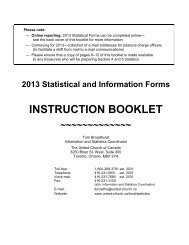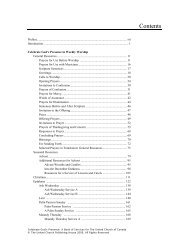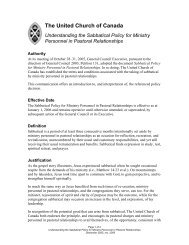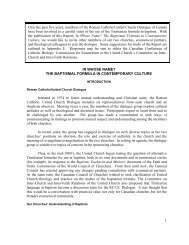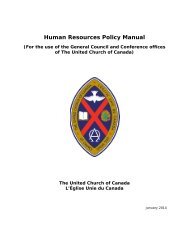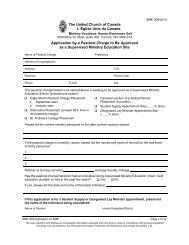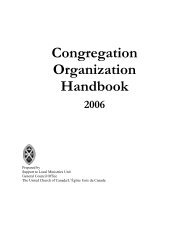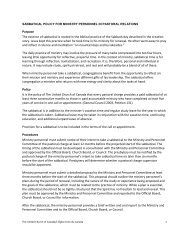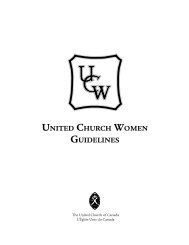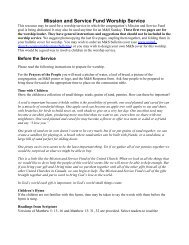Guidelines for Transition Teams - The United Church of Canada
Guidelines for Transition Teams - The United Church of Canada
Guidelines for Transition Teams - The United Church of Canada
You also want an ePaper? Increase the reach of your titles
YUMPU automatically turns print PDFs into web optimized ePapers that Google loves.
Building the Team<br />
Interim Ministers are specially trained to help congregations take the risks involved in trans<strong>for</strong>ming<br />
themselves. Interim Ministers know about change and transition processes; they know about<br />
congregations and how they can get stuck. <strong>The</strong>y bring special techniques to assist a congregation<br />
to work through self-study. <strong>The</strong>y also understand how individuals may react to the prospect <strong>of</strong><br />
change, and can help them cope by <strong>of</strong>fering spiritual guidance and providing pastoral care. Most<br />
importantly, Interim Ministers will anchor the transition process in the great biblical stories to help<br />
the congregation know that it is not alone in the bewilderment that <strong>of</strong>ten comes with change.<br />
Congregational members <strong>of</strong> the team also bring special knowledge to the work <strong>of</strong> transition. <strong>The</strong>y<br />
know the rhythms <strong>of</strong> the congregation’s life—its customs, rituals, and practices as it moves through<br />
the church seasons. <strong>The</strong>y have stories from the past that explain certain things in the present, and<br />
they know about those “sacred cows” that are bound to trigger reaction if prodded. <strong>The</strong> presbytery<br />
representatives on the team also play their part, bringing an outside perspective and a knowledge <strong>of</strong><br />
church policy to the work.<br />
<strong>The</strong> Interim Minister and the other team members play complementary roles. <strong>The</strong> minister is able<br />
to affirm and encourage inexperienced congregational representatives who may feel uncertain about<br />
what they must do. Team members can help the minister be aware <strong>of</strong> seemingly insignificant issues<br />
by explaining the political realities <strong>of</strong> the congregation, and also its fit within its presbytery. As they<br />
interact, the minister gains insight into the congregation, and other team members learn to see the<br />
congregation in a new way. As they learn from each other and collaborate, a synergy builds, and<br />
together they build an effect greater than the effect either could produce alone.<br />
Clarifying Team Values and Mission<br />
As well as understanding the technical requirements and procedures <strong>of</strong> the interim work, members<br />
<strong>of</strong> the <strong>Transition</strong> Team must learn what is expected <strong>of</strong> them personally in terms <strong>of</strong> time, energy, skill,<br />
and commitment. However, that knowledge alone will not be sufficient <strong>for</strong> them to play their pivotal<br />
role in the congregation’s life. <strong>The</strong>y must also establish a mutual understanding <strong>of</strong> and commitment<br />
to the principles and values by which the team will work together. <strong>The</strong>y must feel that they can speak<br />
freely and honestly, and bring all points <strong>of</strong> view to bear on important issues, creating the climate that<br />
is essential <strong>for</strong> the discernment and decision-making that lies ahead.<br />
An effective <strong>Transition</strong> Team is characterized by such qualities as<br />
• a shared understanding by the minister and the other team members about their respective roles<br />
• a shared concern <strong>for</strong> the health <strong>of</strong> the congregation<br />
• general agreement with respect to the desired outcome <strong>of</strong> the transition work; e.g., what will<br />
constitute a “good and sufficient” outcome<br />
• agreed-upon decision-making processes, and commitment to adhere to them<br />
• dedication to regular spiritual reflection<br />
• all-member participation and regular attendance<br />
<strong>Guidelines</strong> <strong>for</strong> <strong>Transition</strong> <strong>Teams</strong> 13



